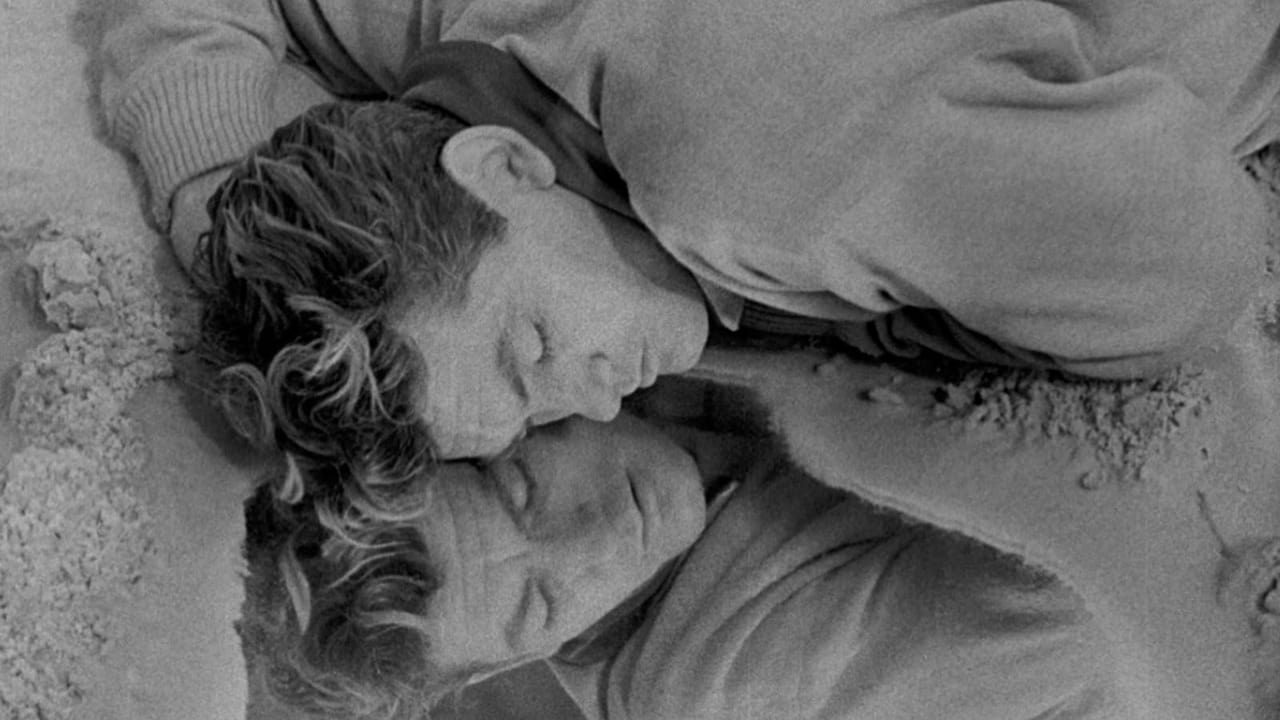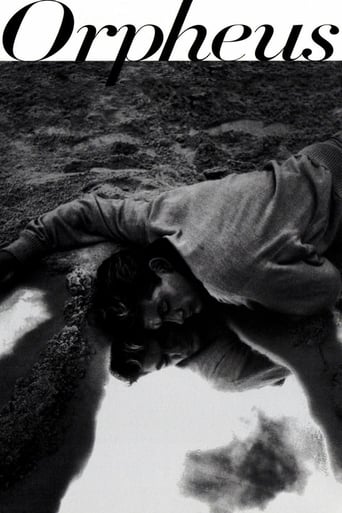



the audience applauded
SERIOUSLY. This is what the crap Hollywood still puts out?
View MoreThe best films of this genre always show a path and provide a takeaway for being a better person.
View MoreLet me be very fair here, this is not the best movie in my opinion. But, this movie is fun, it has purpose and is very enjoyable to watch.
View MoreI enjoy the enthusiasm from user reviewer Dave G ("One of the truly great masterpieces of cinema", Dave G from Sheffield, England, 25 January 2000). Also, from peterehoward ("The closest cinema has come to poetry", peterehoward, United Kingdom, 13 November 2005).Good background information can be found from rdoyle29 ("A timeless fantasy classic", rdoyle29 from Winnipeg, Canada, 17 September 2000). In addition, Ed from NY, NY ("the most poetic of all films", Ed from New York, NY, 23 May 2002) does a good job in figuring out a perplexing plot turn near the end. Jean Cocteau's "Orpheus" (1950) is a bizarre, dream-like journey to the Underworld and back. It is surprising not only because of the depth of its madness, but also because it came out of seemingly buoyant, post-war France. By today's standards the pacing is a little slow; and it is occasionally soporific. However, if you have the patience for it the feeling is this is a cinematic masterpiece that demands repeated viewing.Cocteau's nightmarish retelling of the Greek legend featuring poet Orpheus, his frequently-ignored wife Eurydice and the Princess of Death borrows from personal memories of the director as well as Francophile war experiences. For example, the cryptic radio personality that Orpheus obsesses over is regarded to represent the BBC communicating coded words to the French Resistance. In addition, the mob that will assault Orpheus is derived from early intellectual critics of Cocteau's art.The actors are first-rate. Cocteau's former lover, Jean Marais, is convincing as a celebrity who can compel others with his magnetism. However, two other cast members are exceptional. Maria Casares is mesmerizing as the Princess of Death. François Périer is also note-perfect as the chauffeur Heurtebise. Ms. Casares, who steals all of her scenes, speaks (the frequently insane) lines of her underworld character with total conviction; she is a principal source of the pervasive horror. Périer's Heurtebise is another character who appears at times to be speaking from another world.Visually, Cocteau is interesting throughout. As a writer he creates a grotesque universe. This is a great way to escape mundane human existence--and perhaps, a look at what is coming in the afterlife.
View MoreThis work, arguably Cocteau's finest, transposes the Orpheus myth to a contemporary (though dream-like) setting. Poetry, surrealism and classical mythology blend in an effective and often subtle way as Orpheus struggles to renounce his fixation with Death and reclaim Eurydice from her realm.Notions of what constitutes poetry are questioned throughout. In an inspired move, Cocteau has Orpheus take notes from a "Numbers Station", hinting at the post-War world's obsessive questioning of what actually constitutes art and the paranoia of the emerging Cold War. The character of Orpheus may actually be read to represent a secret agent, rescuing Eurydice from the mysterious realm behind what had just been coined "The Iron Curtain." Death, a doyen of this realm faces trial for treason by a panel of her peers, perhaps a representation of the show trials of the late Stalinist period. Orpheus' infatuation with death is perhaps also a reflection of the mentality of a Cold War spy's coldly murderous ethos. Orpheus' poetry may likewise be as vacuous and ephemeral as the clash of ideologies that prompted the War. Notably, it is when he is denounced as a plagiarist that his infatuation with Death grows, to the point where he no longer cares about Death's opposite, the new life his wife is carrying. He is too blinkered by ideology to see that the child represents the hope of a post-Communist and post-Capitalist future.Entering the mirror world (representing the ideology that is the opposite of his own), Orpheus is presented with a stagnant world of ruins and bureaucrats working to their own agendas, as if time has stood still at the end of the Second World War. This contrasts the relaxed, sun-drenched land of cafés and large modern automobiles in his reality. The numbers stations have entranced him and it is across, into the world of the opposing, "dead" ideology that he enters.Death's helpers are represented as motorcycle police, the very embodiment of the authority of the State and the ideology it represents.As thoughtful as this film is, it has its weaknesses, mostly of a technical nature. Of course, the special effects are primitive to the point of being laughable by today's standards and Marais' acting is weak. Casares does give a fascinating but uneven performance as Death. The films pace also falters at times, undermining the poetic mood that had been so carefully established.Whilst most viewers today will the idea of someone so ruthless and evil as a Cold War spy (of any faction) being presented as a hero to be morally repugnant, particularly in this case as it represents the undermining of the poetic ideal, one must note that Orpheus eventually rejects his infatuation with death and obsession with poetry and returns rescues his wife and child. This, then, can be read, if we follow the allegory to its conclusion, as a rejection of the twin ideologies of Communism and Capitalism and instead looking to a post-ideology future and the traditional values of the family instead of those imposed by either the State or the lure of wealth and fame.
View More1- A film should convey its meaning mostly not in words but moving pictures, otherwise some other form of expression must be used. If you take out the words from this film, you would be left with careless camera-work and settings (see 1931 film Nosferatu for a much careful camera work and settings- and a much better rising from the coffin scene-19 years earlier). Instead of making a film, Cocteau could publish a book of intellectual sentences decorated with still photography and we would not miss a thing."I am your death" may be an effective sentence by itself, but only in poems. If you use such sentences in a film, you must support it with visual elements in some way. 2- Many positive criticism centers on the symbolism hidden. Somebody symbolizes "poet", other one "death", we see how "poet" prefers art (that is listening to radio) to life, how "poet" is fascinated by "death".... But this is dry symbolism appealing only to the intellect but not meant to be felt. Trying to comprehend the feelings of a "poet" could be good, but instead, we are expected to appreciate his/her drama and "poetic cause". Do watchers feel any emotional contact with the "poet"? I don't think so. That is; film should appeal much much more to senses and emotions than the intellect. 3- Many other positive criticism, on the other hand, mentions innovative camera tricks, etc... You can see all of them in films from much earlier times. For example, rising from bed is done much better in Nosferatu(1931). If careless effects usage was intentional, what was the aim? Some intellectual explanation like "reversal just like from death back to life" might just make me laugh.All in all, we should not make injustice to excellent movies which can alter our emotions by comparing them with self-indulgent appraisal of artistic pain.
View MoreJean Cocteau's movie interpretation of the myth of Orpheus may be one of the few movies to deserve the title of magical realist. There's a seamless mixture of fantasy and ordinary life that reminds one of the work of Gabriel García Márquez or José Saramago. Death journeys to the world through mirrors, falls in love with Orpehus, who returns her love, kills Eurydice and tries to take control of him in the underworld.The movie, in spite of its surrealist streak, is more of a fantasy than an intellectual puzzle. Cocteau brings up questions about life, death, poetry, fame, sacrifice and time, but he's not really saying new things. He's an artist and artist don't invent new messages, they merely speak truths that are always under our noses and need to be looked at from a new angle to be perceived. And few have Cocteau's talent to speak them as if they seemed fresh.Jean Marais gives a fascinating performance as Orpheus. But it was François Périer's heartfelt performance as one of Death's aides which won me over. Orpheus's love for Death is reflected in Heurtebise's love for Eurydice. He's a helper, a witness and sometimes Death's consciousness. Being dead, he also seems to be the only one who understands Mankind, so obviously he's prone to some melancholy.The scenes in the underworld are wonderful. Using a derelict church as a setting, Cocteau used few effects to achieve a sense of otherworldliness. To show people passing through mirrors he used mercury vats, to show time in reverse he simply played the image backwards; and other simple (but not simplistic) tricks which are more effective than many sfx today. At times these sequences reminded one of The Blood of a Poet, the supposed first part in the Orpheus trilogy.A triumph of the imagination, Orpheus is a movie that requires watching. I can't imagine anyone regretting watching this pearl of cinema.
View More